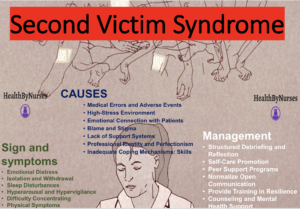In the realm of healthcare, nurses are the frontline warriors, providing critical care, compassion, and expertise to patients in need. Amidst their noble duty, they encounter situations where medical errors or adverse events occur, leading them to become second victims. The phenomenon of Second Victim Syndrome profoundly impacts nurses, causing emotional distress, self-doubt, and trauma. This BLOG delves into the experiences of nurses as second victims, highlighting the challenges they face and proposing strategies to support and empower them.
Nurses often find themselves at the epicenter of patient care, playing a pivotal role in various medical procedures, treatments, and interventions. Their commitment to delivering quality care is unwavering. However, within this demanding environment, the occurrence of adverse events, medication errors, unexpected patient outcomes, or even a patient’s death can profoundly affect nurses. Such events evoke intense emotional turmoil, leading to feelings of guilt, self-blame, and anxiety among these caregivers.

Consider a scenario where a nurse administers medication to a patient but later discovers an error in the dosage. Despite following protocols meticulously, an unintended mistake occurs. The patient’s health is compromised, triggering a cascade of emotional distress within the nurse. The sense of responsibility, coupled with the fear of repercussions and the impact on the patient’s well-being, can have a profound effect on the nurse’s mental and emotional state. The nurse may lead to a second victim syndrome if the health care organization doesn’t follow the just culture (free from blaming and rumors ).
Try to feel the emotional trauma experienced by nurses as the second victim. This can be manifested in various ways. She may face sleep disturbances, anxiety, a loss of confidence in their abilities, and an overall decline in mental well-being. This distress not only affects the nurses personally but also impacts their professional performance and the quality of care they provide to future patients.
Supporting nurses as second victims is paramount to maintaining their well-being and ensuring continued quality care delivery. Institutions and healthcare organizations must foster a culture that encourages open communication, transparency, and psychological safety. Creating support systems such as peer-to-peer counseling, debriefing sessions, and access to mental health professionals is crucial in helping nurses cope with the emotional aftermath of adverse events.
Moreover, education and training programs focusing on resilience, stress management, and coping strategies can equip nurses with the tools to navigate and recover from such traumatic experiences. Encouraging a blame-free environment where errors are seen as opportunities for learning and improvement, rather than grounds for punitive action, is essential in mitigating the emotional burden on nurses.
In conclusion, nurses, as caregivers, face immense pressure and emotional challenges in their line of work. Becoming second victims in the wake of adverse events, they grapple with intense emotional distress and trauma. To support these frontline healthcare professionals, it is imperative to acknowledge their experiences, provide robust support systems, and cultivate a culture of empathy and understanding within healthcare institutions. By doing so, we not only alleviate the burden on nurses but also ensure the delivery of compassionate, high-quality care to patients.

To all nurses,
Please feel free to share your experience as second victim and how you overcome from the same ?